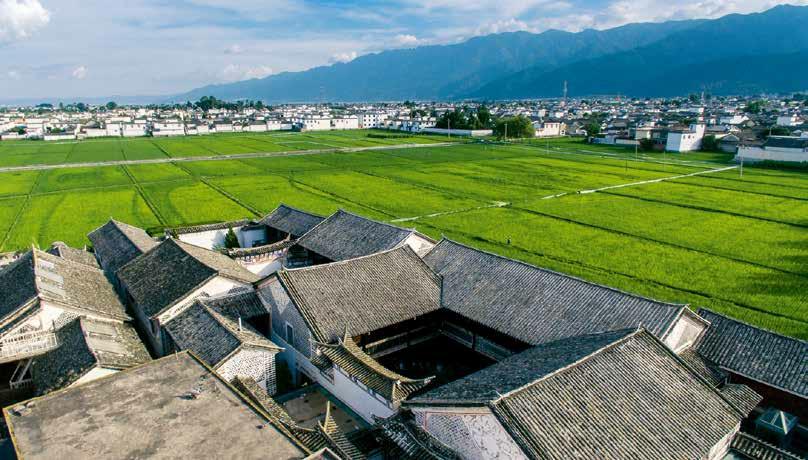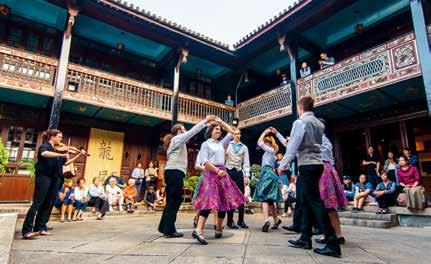Reverence for the Rural Land
2020-02-04byBrianLinden
by Brian Linden


My favorite charac- ter in all of literature is Levin in Tolstoys Anna Karenina. A veiled self-portrait of Tolstoy himself, Levin was able to enjoy simple human experiences at a time when society was increasingly driven by pretension and status.
He openly embraced and struggled with the elation and vulnerabilities of falling in love, the fears and joys of fatherhood, and the uncertainties associated with lifes existential questions. He found solace in his connection with the land, where he would spend days alongside farmers, deriving satisfaction and soundness from the solidarity with his neighbors. Even though he was born of aristocratic lineage, Levin stayed in the countryside and embodied Tolstoys belief that the cultivation of and care for our land would make man better. Levin was human, and his basic humaneness seemed to be inseparable from the land.
As more and more Chinese rural residents migrate to large cities, their quality of life improves. Access to good health care, education, and high-paying jobs turns most residents into much more productive contributors to the countrys economic well-being. But, for those left behind—usually the elderly and the young, how do we maintain a reverence for the countryside that was the metaphysical foundry of Chinese culture for thousands of years?
While tourism development is a worthy attempt to bring more wealth to rural communities, it is not a panacea. Development must not disregard the existing environmental and cultural resources within these regions. Too often, rural communities rush to attract travelers, copy models implemented thousands of miles away, and alter their cultural and agrarian landscapes to appeal to urban travelers whose desires often do not extend beyond an endless search for the best photo ops. In return, some communities receive very few financial benefits, with the fair share of the revenues escaping to outside business interests in a phenomenon known as “tourism leakage.”
In the 20th century, the French Culture Ministry discovered that alongside Paris, world travelers came to France to experience its countryside. The unadorned lifestyles of the local people, the rickety farm houses transformed into hotels, and the slower pace of life evident in the timeless and unaltered town squares appealed to travelers. The countryside was genuine, and the local people took pride in their cultural DNA and refused to change to satisfy any type of travelers. They lived as they always lived, and tourists could either appreciate their cultural traditions or choose to leave. They lacked newly constructed steel-and-glass hotels and never rebuilt old towns merely for modernization. People were attracted to the authenticity of the place—its genus loci. To this day, France, a country smaller than Qinghai Province, attracts the most foreign tourists in the world(89 million people in 2018).

After nearly four decades of interaction with China, I have derived certain aspirations for my adopted home. While they are the musings of an idealistic foreigner, they are all based on feelings of love and respect for this country. Chinas heritage represents one of humanitys greatest cultural treasures. It needs to proceed with caution as we consider ways to develop these resources. It is easy to pursue “temporary veneers” to attract immediate benefits to local communities. While the goal of bringing prosperity to all regions of China is noble and correct, with better planning and more patience, long-term solutions can be developed to highlight the tangible and intangible cultural resources of each region without having to alter them to appeal to the capricious tastes of tourists. Local cultures should remain. Touristsdesires can change. Visitors should not expect the locale to change to meet their needs.
Its time to slow down, learn from past experiences, and develop long-term plans to ensure that communities are the greatest beneficiaries of projects in their back yards. Development is often driven by outside financial interests, and investors are often more concerned about economic returns than the sustainability of a project. Recreated culture, with or without local participation, is hollow and will fail in the long run.
Thus, we should increase the responsibilities on outside businesses entering tourism destinations. For example, local governments should enact a requirement for hotels to hire at least one or two locals per guest room. Such a provision would re-balance investment in communities and help escape the current model that focuses on luxury hardware, outside designs, and gimmick comforts. The latter will inevitably fall out of style in a few years. Original culture, with all its perceived defects, is classic and will always remain attractive to visitors. Just look at Venice, Florence, Paris, Toledo, and other famous destinations. Tourists do not travel to those places to replicate the comforts of home. They travel to be challenged by differences, many of which will no longer exist if we homogenize the tourism experience.
We should also encourage locals to share their hopes and concerns about the future of their communities. The government has developed platforms for such discussions, but businesses often circumvent them and pursue short-term models that contribute little to the local communities. The tourism industry is unfolding on a large canvas that is far from empty. Tourism projects are being developed in cultural and social milieu hundreds and sometimes thousands of years old. An unwillingness or inability to incorporate local culture into these development models will lead to soulless facades and increasingly alienated communities.
“Patience is waiting,” said Tolstoy. “Not passively waiting. That is laziness. But to keep going when the going is hard and slow—thats patience. The two most powerful warriors are patience and time.”
Patience is necessary for tourism development to seize long-term success. We should reserve reverence for the land in its timeless form. Our sense of place rests in these rural areas, and I firmly believe that our soft power must originate from this countrys venerable history, not just solely from the titillating contemporary. The world may be awed by Chinas rapid economic growth over the past four decades, but the knowledge and experiences of the previous thousands of years should be leveraged by China to proudly interact with and enlighten the world.